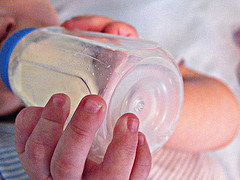 Some rights reserved by nerissa’s ring
Some rights reserved by nerissa’s ring
The Food Safety and Modernization Act (S. 510) has caused a lot of controversy. The good news is that the Tester-Hagan Amendment (if approved) would address some of those concerns, like exempt some “farms that direct market a majority of the product to consumers to clarify that this includes sales made at farmers markets, community supported agriculture drop-off sites, roadside stands and other similar direct market venues”. Although this amendment is being voted on currently, another positive amendment to S. 510, proposed by [amazon_link id=”061326178X” target=”_blank” ]Senator Feinstein[/amazon_link], has already been shut down by the American Chemical Industry’s powerful lobby.
Today the U.S. Senate failed to consider a ban on the toxic chemical bisphenol A, or BPA, in baby bottles and infant feeding cups. Senator Dianne Feinstein, D- Calif., planned to offer the ban as an amendment to the Food Safety Modernization Act. As recently as yesterday, there was enormous support for the amendment from both sides of the aisle, but intense lobbying at the 11th hour by the American Chemistry Council blocked its introduction.
Today the U.S. Senate failed to consider a ban on the toxic chemical bisphenol A, or BPA, in baby bottles and infant feeding cups. Senator Dianne Feinstein, D- Calif., planned to offer the ban as an amendment to the Food Safety Modernization Act. As recently as yesterday, there was enormous support for the amendment from both sides of the aisle, but intense lobbying at the 11th hour by the American Chemistry Council blocked its introduction.
Such action by a the chemical lobby screams to me about what is wrong with our “democracy”. The very companies responsible for poisoning our children (and adults) with a known endocrine-disruptor should not have the power to block legislation that would protect us from heart disease, breast cancer, erectile dysfunction, diabetes, etc.
The Breast Cancer Fund expresses the outrage we all feel:
“It’s a sad day when the chemical industry muscles out children’s health and safety,” said Janet Nudelman, policy director at the Breast Cancer Fund, which led a national coalition that advocated for the ban. “Once again we see the American Chemistry Council prioritize the profits of chemical companies over the public’s health. It is not fair that our nation’s children are on the losing side of this equation.”..
Sen. Feinstein lamented the loss: “The evidence against BPA is mounting, especially its harmful effects on babies and children who are still developing. I very much regret that the chemical industry puts a higher priority on selling chemicals than on the health of infants. I will not cease in my efforts to remove BPA from products where it can harm human health, and I urge consumers to vote with their pocketbooks by refusing to purchase products that contain BPA.”
It is good Feinstein will not give up, but at the same time, [amazon_link id=”B001NDH4HK” target=”_blank” ]BPA[/amazon_link] is hidden in so many products, it is hard for consumers to truly avoid it. The most recent discovery was BPA in cash register receipts, and I am pleased to see our local organic food co-op has switched to BPA-free receipts (although the cashier claims they are going through more paper now).
Something needs to change in our system. We can’t let our health laws continue to be swayed by corporate profits. It’s beyond not fair.
[…] and cadmium in children’s products. I don’t believe their omission is part of some American Chemical Industry lobby conspiracy. Cadmium is mentioned under “Other Toxic Hazards” in the full report. […]